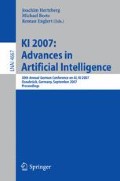Abstract
Many modern control systems, e.g., in automotive or robotic applications get increasingly complex and hard to design. This is due to the complex interactions of their internal subsystems, but additionally, these systems operate in a dynamically changing, complex environment. The Organic Computing (OC) initiative tries to cope with the resulting engineering demands by introducing emergence and self-x properties into the systems (e.g., self-organization, self-optimization). Within this context, we focus on control systems which adapt their behavior autonomously by learning.
Access this chapter
Tax calculation will be finalised at checkout
Purchases are for personal use only
Preview
Unable to display preview. Download preview PDF.
References
Shao, S.: Fuzzy self-organizing controller and its application for dynamic processes. Fuzzy Sets and Systems 26(2), 151–164 (1988)
Brockmann, W.: Online Machine Learning For Adaptive Control. IEEE Int. Workshop on Emerging Technologies and Factory Automation, pp. 190–195 (1992)
Takagi, T., Sugeno, M.: Fuzzy identification of systems and its applications to modeling and control. IEEE Trans. Systems, Man, and Cybernetics 15, 116–132 (1985)
Mitra, S., Hayashi, Y.: Neuro-fuzzy rule generation: survey in soft computing framework. IEEE Trans. Neural Networks 11(3), 748–768 (2000)
Brockmann, W., Horst, A.: Stabilizing the Convergence of Online-Learning in Neuro-Fuzzy Systems by an Immune System-inspired Approach. IEEE Int. Conf. On Fuzzy Systems - FUZZ-IEEE 2007 (to appear, 2007)
Girosi, F., Jones, M., Poggio, T.: Regularization theory and neural networks architectures. Neural Computation 7(2), 219–269 (1995)
Author information
Authors and Affiliations
Editor information
Rights and permissions
Copyright information
© 2007 Springer-Verlag Berlin Heidelberg
About this paper
Cite this paper
Rosemann, N., Brockmann, W. (2007). Concept for Controlled Self-optimization in Online Learning Neuro-fuzzy Systems. In: Hertzberg, J., Beetz, M., Englert, R. (eds) KI 2007: Advances in Artificial Intelligence. KI 2007. Lecture Notes in Computer Science(), vol 4667. Springer, Berlin, Heidelberg. https://doi.org/10.1007/978-3-540-74565-5_49
Download citation
DOI: https://doi.org/10.1007/978-3-540-74565-5_49
Publisher Name: Springer, Berlin, Heidelberg
Print ISBN: 978-3-540-74564-8
Online ISBN: 978-3-540-74565-5
eBook Packages: Computer ScienceComputer Science (R0)

